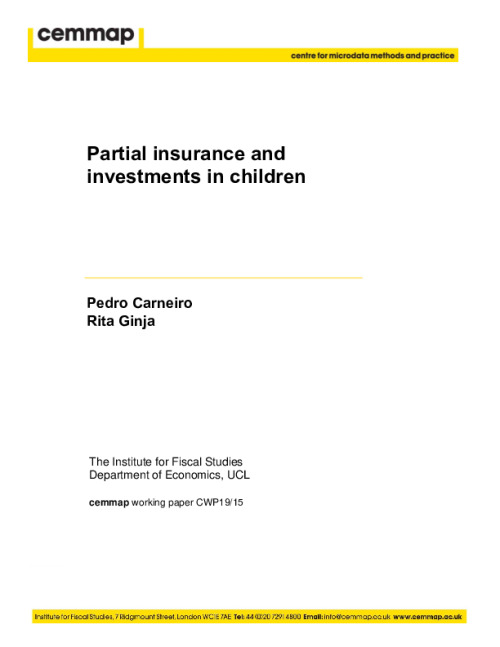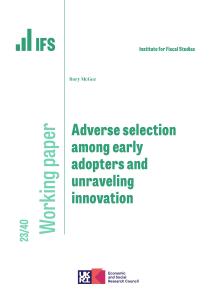Downloads

cwp191515.pdf
PDF | 642.84 KB
This paper studies the impact of permanent and transitory shocks to income on parental investments in children. We use panel data on family income, and an index of investments in children in time and goods, from the Children of the National Longitudinal Survey of Youth. Consistent with the literature focusing on non-durable expenditure, we find that there is only partial insurance of parental investments against permanent income shocks, but the magnitude of the estimated responses is small. We cannot reject the hypothesis full insurance against temporary shocks. Another interpretation of our findings is that there is very little insurance available, but the fact that skill is a non-separable function of parental investments over time results in small reactions of these investments to income shocks, especially at later ages.
Authors

Research Fellow University College London
Pedro is a Professor of Economics at University College London and an economist in the IFS' Centre for Microdata Methods and Practice (cemmap).

Research Associate University of Bergen
Rita is an IFS Research Associate, an Associate Professor at the University of Bergen and a Research Associate at the Uppsala University.
Working Paper details
- DOI
- 10.1920/wp.cem.2015.1915
- Publisher
- Institute for Fiscal Studies
Suggested citation
Carneiro, P and Ginja, R. (2015). Partial insurance and investments in children. London: Institute for Fiscal Studies. Available at: https://ifs.org.uk/publications/partial-insurance-and-investments-children (accessed: 2 May 2024).
More from IFS
Understand this issue

Spring Budget 2024: What you need to know
7 March 2024

Spring Budget 2024: the Chancellor’s options

The £600 billion problem awaiting the next government
25 April 2024
Policy analysis

Spring Budget 2024
6 March 2024

Oil and gas make Scotland’s underlying public finances particularly volatile and uncertain
27 March 2024

Reforming the taxation of non-doms: policy options and uncertainties
4 March 2024
Academic research

Intertemporal income shifting and the taxation of business owner-managers
24 January 2024

Saving by buying ahead: stockpiling in response to lump-sum payments
2 February 2024

Adverse selection among early adopters and unraveling innovation
18 December 2023